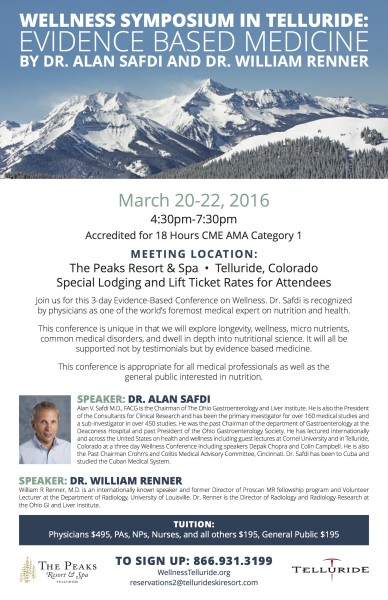
02 Mar To Your Health: Proton Pump Inhibitors & Dementia
Dr. Alan Safdi, one of the most popular speakers at the Telluride First Foundation’s inaugural Integrative Wellness Summit and a regular contributor to Telluride Inside… and Out (To Your Health. Search on our home page, for all his illuminating stories), is a co-speaker at an upcoming wellness symposium. That event takes place over a three-day period staring Sunday, March 20, apres-ski at The Peaks Resort & Spa in Mountain Village. The conference is appropriate for all medical professionals, as well as the general public interested in nutrition and longevity. Topics include longevity, how much exercise do we really need, risks and benefits of supplements and multivitamins, and much more. Accredited for 18 Hours CME AMA Category 1. Tuition: Physicians $495; PAs, NPs, Nurses, and general public: $195. For further information, call 866-931-3199 or send an email or go here.
Scroll down for the next installment of Safdi’s To Your Health column. The subject is proton pump inhibitors.

Do proton pump inhibitors increase the risk of dementia? Are they the correct choice to treat gastro-esophageal reflux?
Proton pump inhibitors (PPIs) are a class of very effective and generally safe medicines used to treat heartburn, gastroesophageal reflux disease (GERD), duodenal ulcers, and gastric ulcers. Some of the most common brands are Prilosec, Nexium, Omeprazole, Dexilant, Pantoprazole, Protonix, and lansoprazole. The meds work by decreasing acid production in your stomach so that when gastric (stomach) fluid comes up into the esophagus, it does not damage the esophagus or whatever damage is done is decreased.
We tend to always reach for a pill, but we should also evaluate non-pharmacologic treatments first or in conjunction with medical interventions. The most important beginning step is keeping our weight near our ideal and evaluating our diets. We need to eat smaller meals and decrease bad fats. Alcohol, peppermint, tomato sauces, large meals, eating late, caffeine, and fatty foods can predispose us to reflux.
So if you have reflux and do everything right but still need proton pump inhibitors to decrease acid production is dementia an awful side effect?
Please look at an earlier post in which we delineated a multitude of potential side effects. Remember these side effects are things we should screen for, yes, but are often exceedingly rare. Some of them include a decrease in iron, calcium or B12 absorption, decreased serum magnesium and, very rarely, kidney damage. I urge all patients to take these medications under the guidance of their healthcare provider to make sure the treatment is correct and side effects are screened for regularly.
This current study on proton pump inhibitors and dementia is a great learning tool.
Why? Well, first of all, it is not a well-controlled, prospective study.
There is no definitive proof in the results that these drugs affect cognitive function. The study did not control for diet or even lifestyle factors to establish causation. We do know however that taking multiple drugs, depression, prior strokes, or diabetes can increase the risk of dementia.
Dementia comes in several shades: It can be true Alzheimer’s or potentially metabolic like B 12 deficiency, or vascular dementia secondary to multiple tiny strokes. Older, sicker patients on multiple medications often have to take PPI’s daily – but it may be other underlying diseases that predispose them to dementia, not the PPI’s. If we look at a group of patients taking PPI’s daily, the BMI may be higher in the PPI group and they may have more medical problems. None of these factors were controlled for in the study.
Diet, lifestyle and education are extremely important factors in looking for the etiology of dementia. And strangely, there appears to be a very strong inverse association on the risk of dementia and education. Since such variables were not evaluated, researchers could not integrate them into the analysis.
Studies like this on proton pump inhibitors prove only one thing absolutely: more research is needed on the subject and we should always try to treat diseases with lifestyle modification along with medicines – if meds are in fact required. PPI’s as a group definitely have some potential side effects, should be used judiciously and under medical direction.
One question that should be asked about reflux not controlled by lifestyle modification is this: Is the group of drugs called PPI’s right for me or could I get by with a milder class of drugs called H2 antagonists (drugs like Zantac, ranitidine, Pepcid, famotidine, etc.) that may have fewer side effects?
Those with serious esophageal disorders should consult with a gastroenterologist or their primary care physician before stopping the medication or changing the dose.
Editor’s Note:
Our relationship with Dr. Alan Safdi started several years ago when we attended a Wellness Conference at The Peaks Resort & Spa. Dr. Safdi, is a gastroenterologist with a talent for offering evidence-based medical findings for healthy living in easily digestible sound bytes. We next heard him speak at Telluride First Foundation’s inaugural Integrative Wellness Conference, where the audience got just a taste of his encyclopedic knowledge on mind-body wellness. To fill in the gaps, Telluride Inside… and Out plans to post nuggets from Dr. Safdi regularly.
More about Dr. Alan Safdi:
Dr. Alan Safdi is a speaker, contributor, and serves on the advisory board of the Telluride First Foundation.
He is board certified in Internal Medicine and in Gastroenterology and is a Fellow of the American College of Gastroenterology. A proven leader in the healthcare arena, he has been featured on the national program, “Medical Crossfire” and authored or co-authored numerous medical articles and abstracts. He has been an investigator in over 581 studies and is President of both the Consultants For Clinical Research and the Ohio Gastroenterology and Liver Institute.
Dr. Safdi has been involved in grant-based and clinical research for about 35 years and is passionate about disease prevention and wellness, not just fixing what has gone wrong. He is an international lecturer on the subjects of wellness, nutrition, and gastoenterology.



Sorry, the comment form is closed at this time.